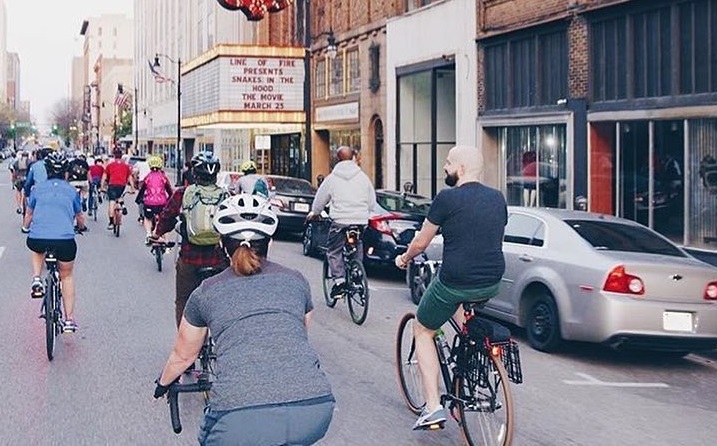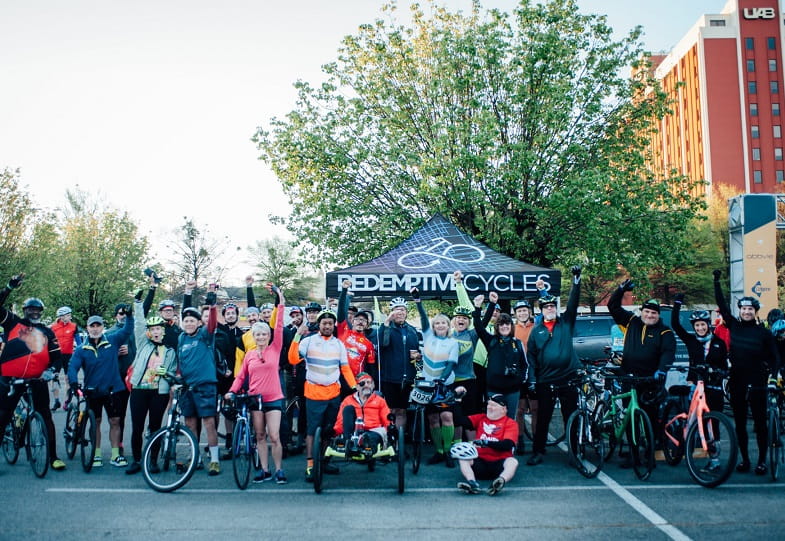She studied ticks in Thailand and a bacterium in TB. Now she empowers the poor to ride bikes.
By Nancy Brown, American Heart Association CEO

Kathryn Doornbos needed a way to unwind from the tedious work of studying the outer membrane proteins of the bacterium that causes tuberculosis.
So one evening she hopped on her bicycle and went for a ride through the streets of Birmingham, Alabama.
It was so refreshing she started making it a habit. During one outing, she encountered a pack of riders. She joined them. When they stopped in a park for a frosty beverage, she stopped, too.
She learned they were part of an organization that helped poor people earn free bicycles. They learned she was a former Fulbright Fellow pursuing a Ph.D. at the University of Alabama-Birmingham.
The camaraderie lured Kathryn back every Thursday at 6:30 p.m. Word of the brainy scientist in their midst filtered to the group's leader, a do-gooder with big ideas who struggled with the administrative end of things.
He asked Kathryn to help write a grant request. She did, and it brought in $2,500.
Then he asked her to help write a more complicated bid. She did, and it brought in $25,000.
Then he asked her to take his place as executive director.
Two years later, it's a toss-up which is more impressive: the impact Redemptive Cycles(link opens in new window) has had on its community or the fact the nonprofit has taken off under the leadership of a microbiologist who spent two years in Bangkok studying the ecological diversity of Thailand ticks.
Both are worth a closer look.
***
Kathryn got into science for the purest of reasons. She wanted to save lives.
Yet the deeper she dove into the world of academic science, the less of a difference she thought she could make.
Exhibit A: Her dissertation. Even if it led to a breakthrough, she feared it would take years to change anything. She wasn't interested in a post-doctorate fellowship, and she didn't like her odds of landing a tenure-track position at a college.
Another dagger to her aspirations came as she pursued money for a research project.
Her grant application to the National Institutes of Health earned a score of 23. Anything less than 25 was considered a shoo-in. A contact at the NIH even told her, "You're good." But then came a reduction in funding and a spike in low-scoring applications. The cutoff dropped to 22.
Everything she'd been working toward seemed headed toward a dead end.
Those were among the thoughts she was working through when she pedaled into the weekly "Trample" organized by the folks at Redemptive Cycles.
***
Redemptive Cycles is the brainchild of Marcus Fetch(link opens in new window). He wanted people who were homeless or living in missions to have their own bikes, or to repair those they had, because of what they provided: freedom, transportation, exercise and more.
He started his crusade in a Birmingham warehouse in 2012. The organization moved into its own place in 2013 and earned federal nonprofit status in 2014.
It's run as a regular bike shop, selling new and used bicycles, parts and accessories, plus offering repairs. The difference is that revenue supports its four core programs:
- Earn-A-Bike – volunteer for 12 hours and a bike is yours.
- Sliding Scale Repairs – pay what you can afford, an honor system to keep bikes rolling.
- Public Workstation – a free, do-it-yourself tool bench.
- Mechanics Classes – a deeper dive into repairs.
There's a social component, too.
In addition to the store being a great place to hang out, there's the Trample(link opens in new window), a roughly 10-mile ride covering a different route each week. It's so welcoming that people don't even need a bike; just show up and the shop will lend you one.

***
The first grant Kathryn pursued for Redemptive Cycles was for the Public Workstation.
She loved the idea. And while it seemed obvious that offering free tools and how-to lessons would be beneficial, she sought research to bolster the case.
"I found data showing that when people feel competent fixing their bike, they're more likely to ride," Kathryn said.
Four weeks later, a check arrived. For Kathryn, it was exhilarating. It was immediate. It was directly helping lives.
It was everything she liked about science without the parts she didn't like.
Still, Kathryn was getting paid to study Mycobacterium tuberculosis. That had to remain her focus.
But she soon found herself participating in the CHIA Workshop, Part 1 of an annual grant competition from UAB that provides Community Health Innovation Awards(link opens in new window). Part 2 was being guided through the application process, followed by a final presentation to a panel that handed out grants of up to $25,000.
"Without realizing it, I was going through fundraising boot camp," she said.
Kathryn's pitch focused on Earn-A-Bike and Sliding Scale Repairs. When she read the email announcing the winners, she hit refresh and opened it again to make sure she had read it correctly. Then came the tears.
"It was external validation that, yes, we're doing things that people who are a big deal in Birmingham think is worthy," she said. "It helped me and the organization see that we were onto something."
It also gave Marcus further proof that Redemptive Cycles was onto something with Kathryn.
***
When he asked her to take over, her first thought was that the job required someone more extroverted.
"Then I thought, `This could be really cool,'" she said. "The board was completely gung-ho about it. They were also shocked. `You want to go from grad school to here?'"
With her scientific precision, the organization has gone from juggling an operating revenue of less than $1,000 to enjoying a three-month cushion. (I'm happy to note that Redemptive Cycles received $2,500 from my organization, the American Heart Association, through our 2018 EmPOWERED to Serve Urban Health Accelerator(link opens in new window).)
All four full-time employees, including her, make the same salary. Each now has health insurance. They also have life insurance; it was her Christmas gift last year.
"They know me well enough that it wasn't awkward," she said, laughing.
Earn-A-Bike annually serves from 150 to 175 clients. Yet that program is no longer the biggest line-item on the budget. In what could be a reflection of how many bikes the group has put, and kept, on the streets, the top expense is Sliding Scale Repairs.
"We trust that people are trying, but we're still paying 85 percent of the cost," she said. "It's OK, though, because it keeps people moving."
She proudly notes that, since the CHIA boost in 2017, Earn-A-Bike and Sliding Scale Repairs have remained continuously funded. That means Redemptive Cycles hasn't turned away a single person.
"It's a real gift when someone asks you to help and you can say `yes' unabashedly," she said.
***

As Redemptive Cycles thrives in Birmingham, the obvious question is whether it can be replicated elsewhere.
The answer is complicated.
The programs themselves certainly can be copied. In fact, most are copies.
The challenge is reproducing this organization's mix of people on the giving and receiving ends who've turned it into something special.
Kathryn is advising people launching similar concepts in Huntsville, Alabama, and Tampa, Florida. Her core advice: "Be mindful of the population you're serving."
That wisdom should hardly come as a surprise. For this executive director with a doctorate in bacteriology, everything comes back to the joy of serving people in a way that can be seen without a microscope.
"I often have clients who share stories about getting a job or shortening their commute by 40 minutes," she said. "A homeless guy visited the other day all excited because he rides his bike so much that he'd lost weight.
"I feel like a bad scientist for saying this, but the short timeline of being able to help people in their moment of need, it's very satisfying."
A version of this column also appeared on Thrive Global.(link opens in new window)
If you have questions or comments about this story, please email [email protected].





